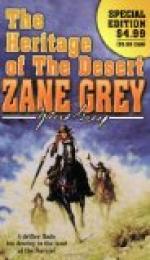All had finished eating, except Snap and Dave Naab, when one of the mustangs neighed shrilly. Hare would not have noticed it but for looks exchanged among the men. The glances were explained a few minutes later when a pattering of hoofs came from the cedar forest, and a stream of mounted Indians poured into the glade.
The ugly glade became a place of color and action. The Navajos rode wiry, wild-looking mustangs and drove ponies and burros carrying packs, most of which consisted of deer-hides. Each Indian dismounted, and unstrapping the blanket which had served as a saddle headed his mustang for the water-hole and gave him a slap. Then the hides and packs were slipped from the pack-train, and soon the pool became a kicking, splashing melee. Every cedar-tree circling the glade and every branch served as a peg for deer meat. Some of it was in the haunch, the bulk in dark dried strips. The Indians laid their weapons aside. Every sagebush and low stone held a blanket. A few of these blankets were of solid color, most of them had bars of white and gray and red, the last color predominating. The mustangs and burros filed out among the cedars, nipping at the sage and the scattered tufts of spare grass. A group of fires, sending up curling columns of blue smoke, and surrounded by a circle of lean, half-naked, bronze-skinned Indians, cooking and eating, completed a picture which afforded Hare the satisfying fulfilment of boyish dreams. What a contrast to the memory of a camp-site on the Connecticut shore, with boy friends telling tales in the glow of the fire, and the wash of the waves on the beach!
The sun sank low in the west, sending gleams through the gnarled branches of the cedars, and turning the green into gold. At precisely the moment of sunset, the Mormon women broke into soft song which had the element of prayer; and the lips of the men moved in silent harmony. Dave Naab, the only one who smoked, removed his pipe for the moment’s grace to dying day.
This simple ceremony over, one of the boys put wood on the fire, and Snap took a jews’-harp out of his pocket and began to extract doleful discords from it, for which George kicked at him in disgust, finally causing him to leave the circle and repair to the cedars, where he twanged with supreme egotism.
“Jack,” said August Naab, “our friends the Navajo chiefs, Scarbreast and Eschtah, are coming to visit us. Take no notice of them at first. They’ve great dignity, and if you entered their hogans they’d sit for some moments before appearing to see you. Scarbreast is a war-chief. Eschtah is the wise old chief of all the Navajos on the Painted Desert. It may interest you to know he is Mescal’s grandfather. Some day I’ll tell you the story.”
Hare tried very hard to appear unconscious when two tall Indians stalked into the circle of Mormons; he set his eyes on the white heart of the camp-fire and waited. For several minutes no one spoke or even moved. The Indians remained standing for a time; then seated themselves. Presently August Naab greeted them in the Navajo language. This was a signal for Hare to use his eyes and ears. Another interval of silence followed before they began to talk. Hare could see only their blanketed shoulders and black heads.




